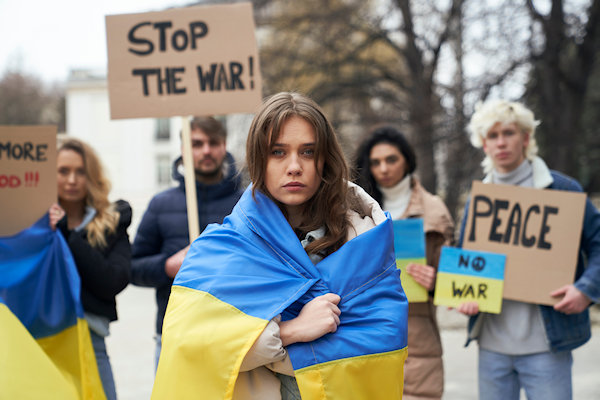www.indybay.org
There seems to be a resurgence of the belief that a balance in geopolitics can only be achieved through deterrence & military strength, while faith in the rule of law and compromise to secure peace is waning. This is wrong. Despite the setbacks we keep experiencing, we must continue to work to secure peace in the world through negotiations, treaties and agreements, not threats.
Juli Zeh on the war in Ukraine: Negotiate, don’t wish
[This interview posted on 12/29/2024 is translated from the German on the Internet, https://www.telepolis.de/features/Juli-Zeh-zum-Ukraine-Krieg-Verhandeln-statt-Wuenschen-10217681.html,]
Zeh criticizes the policy of military strength and war advocacy by urban media professionals. She calls for more courage to negotiate. A Telepolis interview.
The escalation in the Russian-Ukrainian war since Russian troops invaded Ukraine on February 24, 2022 has now lasted more than 1000 days.
Over a million dead and injured, and the danger of the war spreading as a result of further NATO missile deliveries to Ukraine are increasing pressure on the German government to work for a ceasefire. In an appeal, 38 public figures have come out in favor of peace negotiations.
The writer Juli Zeh is one of the signatories of the appeal. In the Telepolis interview, she talks about the need for a negotiated solution to the war in Ukraine, the neglect of international law, conflicts between urban and rural populations, including on the peace issue, and the contribution of writers to peace.
You have signed the “Appeal of the 38: One minute to twelve!” Ms. Zeh, what motivated you to do so?
Zeh: The war in Ukraine is a catastrophe for the people of Ukraine and continues to pose a blatant threat to security in Europe and worldwide. The efforts to end this war must not be allowed to wane just because it has been going on for so long.
Most of the people who signed the new appeal have been saying for a long time that the war cannot end any other way than by a ceasefire and an attempt to find a negotiated settlement – even if it is not what we would like.
Of course, if it were fair, Russia would have to be defeated and Ukraine would have to be restored to its territory. However, we must not argue with what is desirable, but with what is practically feasible and the urgent need to minimize a more serious security threat.
That is why we have now repeated once again that the diplomatic route must be taken, if possible with German involvement.
Who pays for the policy of war?
In your earlier literary work, you dealt with the role of international law in war. Can it contribute to peace? Does it have to be fought for again and again by all of us?
Zeh: The effectiveness and validity of international law has been severely undermined in the last two decades because powerful nations have not adhered to it. This includes countries in the Western hemisphere.
At the moment, there seems to be a resurgence of the belief that a balance in geopolitics can only be achieved through deterrence and military strength, while faith in the rule of law and compromise to secure peace is waning.
This is wrong. Despite the setbacks we keep experiencing, we must continue to work to secure peace in the world through negotiations, treaties and agreements, and not through mutual threats.
In your more recent literary work, you deal with conflicts between urban and rural populations. What do you see as the causes of these conflicts and to what extent can they be exacerbated by war and armament?
Zeh: It is mainly about conflicts between socio-cultural groups. The people in the rural area where I live often have the impression that the editorial offices and political offices of the capital cities are boldly demanding an unconditional continuation of the war – while precisely these rich, educated and mobile people in the cities would never be willing to die at the front.
They would also be the first to leave the country and seek safety if Germany were to be threatened with war, because they can work in their professions in other places, speak languages and perhaps have friends abroad.
In other words, people in the less mobile, more down-to-earth and less educated sections of society often think: “You demand and decide things that we may have to suffer the consequences of.” This generates anger, and I can often understand this anger.
Writers for peace: a constructive discourse
The appeal of the 38 demands: “We appeal to all political actors: let’s forget our differences and act together to prevent the worst!” What role do you think writers can play in this? Why and how should they work for peace today?
Zeh: We writers can’t decide anything, but we can try to contribute to the discourse, change perspectives and enable objective discussions. With many important questions, it is currently a matter of conducting the discourse in a less moral way and in a more pragmatic and constructive way – and in doing so, to incorporate the interests of as many groups as possible.
This is actually normal democratic practice, but we are currently finding it a little difficult. I think writers, who are used to empathizing with other people, can perhaps help a little here.
Benjamin Roth spoke with Juli Zeh. Juli Zeh is a writer, holds a doctorate in law and is an honorary judge at the Brandenburg Constitutional Court.
She is also active as a journalist and speaks out in political debates – including on the NSA affair and on fundamental rights violations in the Covid-19 pandemic. Most recently, her books “Zwischen Welten” with Simon Urban were published by Lucherhand-Verlag and “Der war’s” with Elisa Hoven by Carlsen-Verlag.
